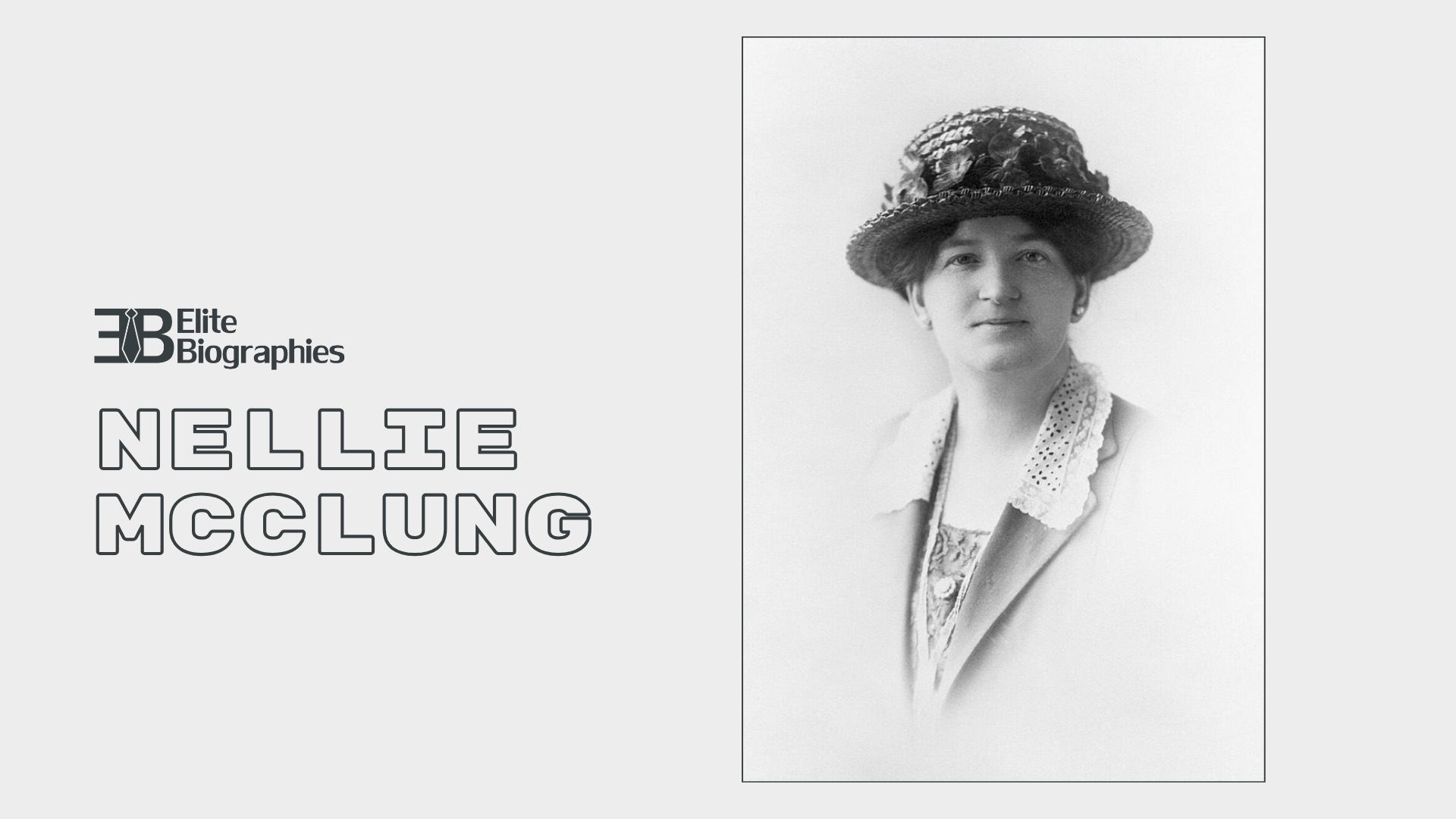Nellie McClung

Nellie McClung was a trailblazing Canadian author, social activist, and feminist. She played a pivotal role in the women’s suffrage movement in Canada and left an indelible mark on the country’s social and political landscape.
Early life
Nellie Letitia Mooney, later known as McClung, was born on October 20, 1873, in Chatsworth, Ontario, as the youngest in a family of six children to parents John and Letitia Mooney (née McCurdy). The family’s 60-hectare (150-acre) farm in Chatsworth struggled due to poor soil quality, leading to financial difficulties. In 1880, when Nellie was seven, the Mooneys relocated to the Souris River valley, situated about two hundred kilometers west of Winnipeg. At the age of sixteen, Nellie completed her education at the Manitoba Normal School, subsequently earning her teaching certificate. She began her teaching career in Hazel, Manitoba, with a monthly salary of $40. After an 18-month stint in Hazel, Nellie transferred to Manitou.
McClung’s early life was marked by her experiences in the Canadian frontier, which shaped her perspectives on social justice and equality. She became a teacher at the age of 16, and her experiences in this role further fueled her passion for women’s rights, particularly in the area of education.
In Manitou, while residing with the McClung family, Nellie was greatly influenced by Mrs. Annie E. McClung, an active suffragist and the provincial president of the Woman’s Christian Temperance Union (WCTU). Nellie admired Mrs. McClung profoundly, once remarking that she was the only woman she could envision as a mother-in-law. Nellie married Mrs. McClung’s son, Robert Wesley, in August 1896, and the couple had five children between 1897 and 1911. McClung was actively involved in various local organizations, including the WCTU, the Methodist Ladies’ Aid, the Epworth League, and the Home Economics Association.
Career
Nellie McClung’s career was multifaceted and influential. She began as a teacher but soon transitioned into writing and activism. Her first novel, “Sowing Seeds in Danny,” published in 1908, was a critical and commercial success, establishing her as a significant voice in Canadian literature.
By 1910, McClung had published her second book, “A Second Chance.” By this time, her renown as a speaker had spread to Ontario, prompting her to undertake a speaking tour across the province, with stops in cities like Whitby, Hamilton, Peterborough, Kingston, Waterloo, and Toronto. Her presentations were highly acclaimed, with the Hamilton Herald noting that she “captivated her audiences.” During the 1910s, McClung authored three additional books, including “In Times Like These,” which is recognized as a significant contribution to first-wave feminism. Over her career, she penned sixteen books, comprising two autobiographies, numerous poems, short stories, and newspaper articles.
In 1911, the McClungs relocated to Winnipeg after Wesley was offered a job as an insurance broker. The next year, McClung, along with fourteen other women, established the Women’s Political Equality League to champion women’s suffrage. In 1914, they approached Manitoba’s Conservative Premier, Rodmond Roblin, to request voting rights for women, but were turned down. In response, the League organized a “Mock Parliament” at the Walker Theatre, where members parodied government ministers. In this event, McClung impersonated Premier Roblin, humorously echoing the arguments he had used the previous day.
McClung’s literary career included several novels and collections of short stories, often focusing on themes of women’s rights, social reform, and the human condition. Her writing was characterized by wit, humor, and a deep sense of social justice, which helped her messages resonate with a wide audience.
Aside from her literary achievements, McClung was a formidable activist. She played a crucial role in the women’s suffrage movement in Canada, particularly in Manitoba, where her efforts contributed significantly to women gaining the right to vote in 1916. She was a part of the “Famous Five,” a group of Canadian women who, in 1929, successfully challenged the Canadian Supreme Court’s definition of “persons,” paving the way for women to be appointed to the Senate.
This case fought for the recognition of women’s eligibility to serve in the Canadian Senate. In a historic move, McClung became the first woman to join the board of the Canadian Broadcasting Corporation in 1936. Further extending her influence, she represented Canada as a delegate to the League of Nations in Geneva, Switzerland, in 1938.
McClung’s activism extended beyond women’s suffrage. She advocated for social reforms, including improved healthcare, education, and prohibition. Her work had a lasting impact on Canadian social policy and the role of women in society.
In 1933, Nellie McClung relocated to Victoria, British Columbia, where she spent the rest of her life. During the late 1930s, her health began to decline, and in 1940, she experienced a heart attack while attending a meeting of the CBC board in Ottawa. This incident significantly hindered her ability to travel. Despite these challenges, McClung remained active on the board through written correspondence until her resignation in 1942. She released the second volume of her autobiography, “The Stream Runs Fast,” in 1945. McClung passed away on September 1, 1951, at the age of 77.

Net Worth
Determining the net worth of historical figures like Nellie McClung is challenging due to the lack of contemporary financial data. However, her success as an author and speaker, along with her prominent role in society, suggests that she was financially stable for her time.
Achievement
Nellie McClung’s achievements are numerous and significant. Some of her most notable contributions include:
McClung’s legacy is celebrated in various ways, including the naming of schools and public spaces after her, and her portrayal on the Canadian $50 bill as part of the ‘Famous Five.’
Related Bios

Molly Fletcher
Once dubbed “the female Jerry Maguire” by CNN and ESPN, Molly Fletcher made a name for herself as a sports agent, ...
Read More
Chris Pronger
Chris Pronger is a former professional ice hockey player and Hall of Famer known for his exceptional skills and achievem...
Read More
Christine Sinclair
Christine Sinclair is a renowned Canadian soccer player, celebrated for her exceptional skill and leadership on the fiel...
Read More
Hayley Wickenheiser
Regarded as one of the greatest female hockey players of all time, Hayley Wickenheiser is a Canadian icon whose career i...
Read More